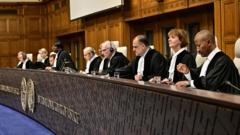The words of the court’s ruling in January have been subject to intense scrutiny and it’s centred around the use of the word “plausible”, with this key paragraph drawing the most attention:
“In the Court’s view, the facts and circumstances…are sufficient to conclude that at least some of the rights claimed by South Africa and for which it is seeking protection are plausible.”
This was interpreted by many, including some legal commentators, to mean that the court had concluded that the claim that Israel was committing genocide in Gaza was “plausible”. This interpretation spread quickly, appearing in UN press releases, statements from campaign groups and media outlets including the BBC.
In April, however, Joan Donoghue, the president of the ICJ at the time of that ruling, said in a BBC interview that this was not what the court had ruled.
Rather, she said, the purpose of the ruling was to declare that South Africa had a right to bring its case against Israel and that Palestinians had “plausible rights to protection from genocide” – rights which were at a real risk of irreparable damage.
The judges had stressed that they did not need to say for now whether a genocide had occurred but concluded that soe of the acts South Africa complained about, if they were proven, could fall under the United Nations’ Convention on Genocide.
You can read more from about the background to the case here.
